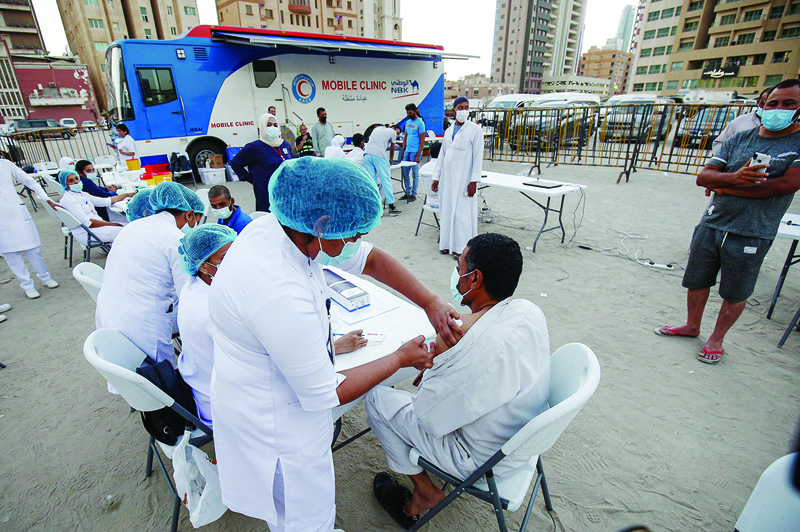 KUWAIT: People are vaccinated against COVID-19 at a field clinic in Bneid Al-Gar yesterday, a day after the health ministry announced it is launching a COVID-19 vaccination campaign across several areas in Kuwait. - Photo by Yasser Al-Zayyat
KUWAIT: People are vaccinated against COVID-19 at a field clinic in Bneid Al-Gar yesterday, a day after the health ministry announced it is launching a COVID-19 vaccination campaign across several areas in Kuwait. - Photo by Yasser Al-Zayyat
PARIS/GENEVA: Vaccination is highly effective at preventing severe cases of COVID-19, even against the Delta variant, a vast study in France has shown. The research published yesterday - focusing on prevention of severe COVID and death, not infection - looked at 22 million people over 50 and found those who had received jabs were 90 percent less likely to be hospitalized or die. The results confirm observations from the US and UK, but researchers say it is the largest study of its kind so far.
Looking at data collected starting in Dec 2020, when France launched its jab campaign, the researchers compared the outcomes of 11 million vaccinated people with 11 million unvaccinated subjects. They formed pairs matching an unvaccinated individual with a vaccinated counterpart from the same region and of the same age and sex, tracking them from the date of the vaccinated person's second jab to July 20.
Starting 14 days after a second dose, a vaccinated subjects' risk of severe COVID was reduced by 90 percent, according to the research conducted by Epi-Phare, an independent medicines safety research group that works closes with the French government. Vaccination appears to be nearly as effective against for the Delta variant, with 84 percent protection for people 75 and older and 92 percent for people 50-75.
That estimate, however, is only based on a month of data, since the variant became dominant in France only in June. "The study should be followed up to include results from August and September," epidemiologist Mahmoud Zureik, the head of Epi-Phare, told AFP. The study covers vaccination with the Pfizer/BioNtech, Moderna and AstraZeneca jabs, but not Jannsen which was authorized much later and is far less widely used in France. The results also suggest that over the period of study - up to five months - vaccination protection against severe COVID did not diminish.
Meanwhile, the World Health Organization's vaccine advisers yesterday recommended people with weakened immune systems should be offered an additional dose of all WHO-approved COVID-19 vaccines. The UN health agency's experts also said over-60s fully immunized with China's Sinovac and Sinopharm vaccines should be offered an additional third COVID-19 vaccine dose.
The Strategic Advisory Group of Experts on Immunization (SAGE) stressed it was not recommending an additional booster dose for the population at large, which is already being rolled out in some countries. The WHO wants a moratorium on booster doses for the general population until the end of the year to prioritize first doses in the dozens of nations starved of vaccines. SAGE said it would review the issue of general booster doses on Nov 11.
Several COVID-19 vaccines have been given WHO approval for emergency use during the pandemic: Pfizer-BioNTech, Janssen, Moderna, Sinopharm, Sinovac and AstraZeneca. The WHO is also on the verge of deciding whether to give emergency use listing (EUL) to India's Bharat Biotech jab. SAGE held a four-day meeting last week to review the latest information and data on a range of vaccines for Covid-19 and other diseases.
"SAGE recommended that moderately and severely immunocompromised persons should be offered an additional dose of all WHO EUL Covid-19 vaccines as part of an extended primary series," the group said. "These individuals are less likely to respond adequately to vaccination following a standard primary vaccine series and are at high risk of severe COVID-19 disease."
Kate O'Brien, the WHO's vaccines chief, said the extra dose should be considered as part of the normal Covid-19 immunization course for people with weaker immune systems, to be administered after a wait of one to three months. It should bring their level of protection up to that demonstrated to prevent against severe disease, hospitalization and death in clinical trials - from which people with immunocompromised conditions were excluded.
SAGE also said that for people fully immunized with Sinovac and Sinopharm vaccines - both two-dose regimens - an additional third shot of the same jab "should be offered to persons aged 60 and above". A different vaccine "may also be considered based on vaccine supply and access considerations". SAGE added that when implementing this recommendation, countries should initially aim at maximizing two-dose coverage in that population, and thereafter administer the third dose, starting in the oldest age groups.
The Sinopharm jab is used in 69 countries, while Sinovac has been rolled out in 36, according to an AFP count. Algeria, Egypt, Ethiopia, Pakistan and the Philippines are among the countries using both jabs, besides China. Sinopharm is also used in Bangladesh, Hungary, Iran, Kenya, Nigeria, Peru, Sri Lanka and the United Arab Emirates. Sinovac is used by Brazil, Chile, Colombia, Indonesia, Malaysia, Mexico, Singapore, Turkey and the Ukraine. - AFP




